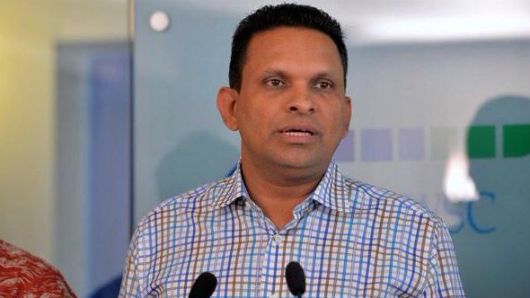The United States, United Kingdom and the European Union have expressed concern with the lack of due process in the trial of former President Mohamed Nasheed, who was convicted of terrorism charges and sentenced to 13 years in prison last night.
“Despite the calls from the international community for due process to be followed, we are concerned that the former President’s trial has not been conducted in a transparent and impartial manner or in accordance with due legal process,” said UK Foreign Office Minister Hugo Swire in a statement.
He added that the UK would be watching the appeal process closely.
“I recognise that this outcome will be deeply worrying for many in the Maldives. I therefore urge calm across the Maldives and encourage all political parties to act with moderation, restraint and within the bounds of the law,” Swire urged.
“We have been consulting closely on our concerns with Commonwealth partners, and we will continue to do so over the coming days.”
The US meanwhile expressed concern with “the apparent lack of appropriate criminal procedures during the trial”.
“We are particularly troubled by reports that the trial was conducted in a manner contrary to Maldivian law and Maldives’ international obligations to provide the minimum fair trial guarantees and other protections under the International Covenant on Civil and Political Rights (ICCPR),” reads a statement by the US embassy in Colombo.
“This includes the denial of legal representation to former President Nasheed during the first hearing and concerns regarding the lack of impartiality and independence of the judges.
“We call on the government of Maldives to take steps to restore confidence in its commitment to democracy and the rule of law, including judicial independence, and to ensure fundamental rights are respected including the freedom of speech and of the press as well as the right to peaceful assembly and peaceful protest. We urge the government to ensure former President Nasheed’s safety and well being in custody, and we hope all Maldivians will express their views peacefully.”
The EU said Nasheed’s conviction “raises very serious questions about due process of law and risks undermining people’s trust in the independence of the judiciary.”
The EU statement also noted that due legal process was obligatory for the Maldives under the ICCPR.
“Should the conviction be appealed, the appeal process must be fair and transparent with former President Nasheed being accorded all his rights, including adequate access to his lawyers,” the EU stated.
“The European Union calls on all sides in the Maldives to act responsibly and uphold constitutional freedoms.”
Indian External Affairs Ministry Spokesperson Syed Akbaruddin meanwhile tweeted saying India was “deeply concerned at developments in the Maldives, monitoring situation closely.”
“Travesty of justice”
Foreign Minister Dunya Maumoon has previously condemned international statements of concern, stating: “Those who prefer to issue public statements about an on-going legal case, or on a domestic political situation, are advised to do a basic fact-check, before bandwagoning on to accusations made by a political party.”
Dunya asserted in a statement that President Abdulla Yameen’s administration “will not take instructions from a foreign government on any issue in governing the country.”
Moreover, President Yameen has declared that foreigners would not be allowed to meddle in domestic affairs and the ruling Progressive Party of Maldives (PPM) has condemned the international community’s “hypocrisy and double standards” with regard to Nasheed’s trial.
Meanwhile, in a statement today, Amnesty International said Nasheed’s sentencing “after a deeply flawed and politically motivated trial is a travesty of justice.”
“Amnesty International condemns the conviction of Mohamed Nasheed to 13 years in jail by judges who were state witnesses during an earlier investigation of this case. This trial has been flawed from start to finish, and the conviction is unsound,” said Richard Bennett, Amnesty International’s Asia-Pacific Director.
“Rather than responding to international calls to strengthen the impartiality of the judiciary the government of the Maldives has proceeded with this sham trial for political reasons”.
Amnesty noted that the opposition leader was denied legal representation at the first hearing of the trial and that at latter hearings his lawyers were not given sufficient time to prepare his defence.
Nasheed’s conviction last night received widespread coverage in international media and was greeted with outrage by several prominent figures who have called for his release.
Sir Richard Branson, founder of Virgin Group, called the outcome of the trial “beyond a joke” and declared he would not visit the Maldives until the opposition leader was released.
Urge everyone worldwide who believes in freedom to boycott the Maldives until true democracy is restored http://t.co/MCcRmL0TlK
— Richard Branson (@richardbranson) March 13, 2015
Tragic news. Climate hero @MohamedNasheed sentenced to 13 yrs in jail by thugs running #Maldives, #FreePresidentNasheed
— Bill McKibben (@billmckibben) March 13, 2015
RT: Nelson Mandela was charged and convicted for terrorism. So was Ghandi. This is not a new game. #FreeNasheedNow pic.twitter.com/USTudNr3Fo
— Sylvia A. Earle (@SylviaEarle) March 13, 2015
It is outrageous that the Maldivian government is getting away with such atrocious clearly political thuggery in… http://t.co/kSxAfu4KaC
— Sylvia A. Earle (@SylviaEarle) March 13, 2015
Related to this story
Former President Nasheed found guilty of terrorism, sentenced to 13 years in prison
Nasheed trial “not free or fair,” says Maldivian Democracy Network
Foreigners cannot meddle in domestic affairs, declares President Yameen
PPM accuses international community of “double standards and hypocrisy” in Nasheed’s trial
“This is not a court of law. This is injustice,” Nasheed tells the Criminal Court
Global change makers demand a fair trial for Nasheed
Indian Prime Minister Modi cancels Maldives trip
EU, UN join international chorus of concern over Nasheed’s arrest, terrorism trial
Foreign Minister Dunya slams Canada, Commonwealth statements on Nasheed prosecution

